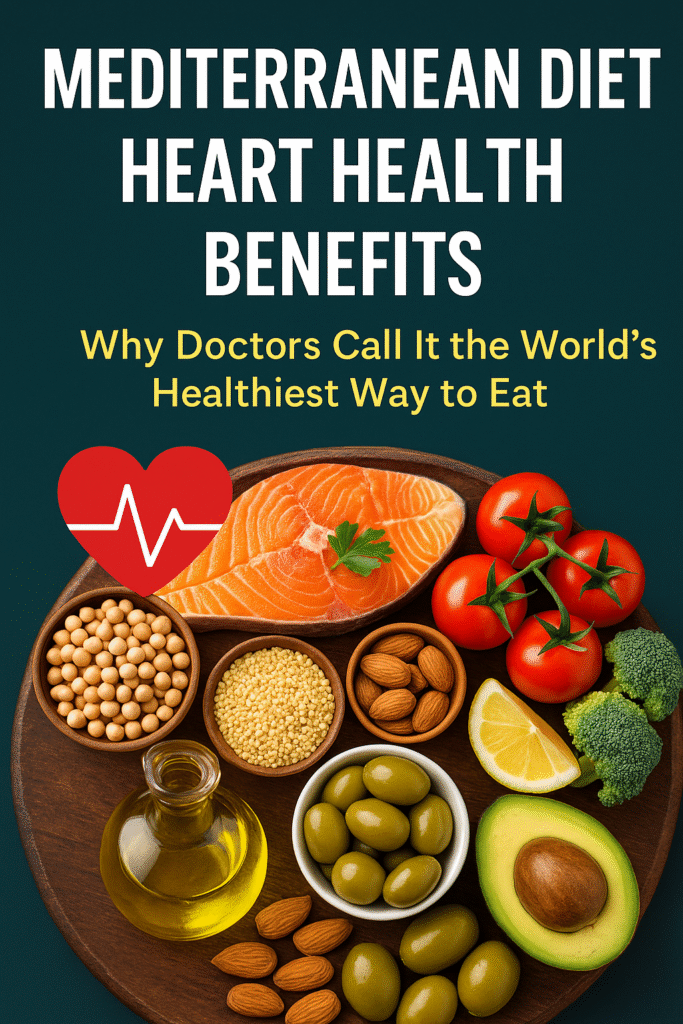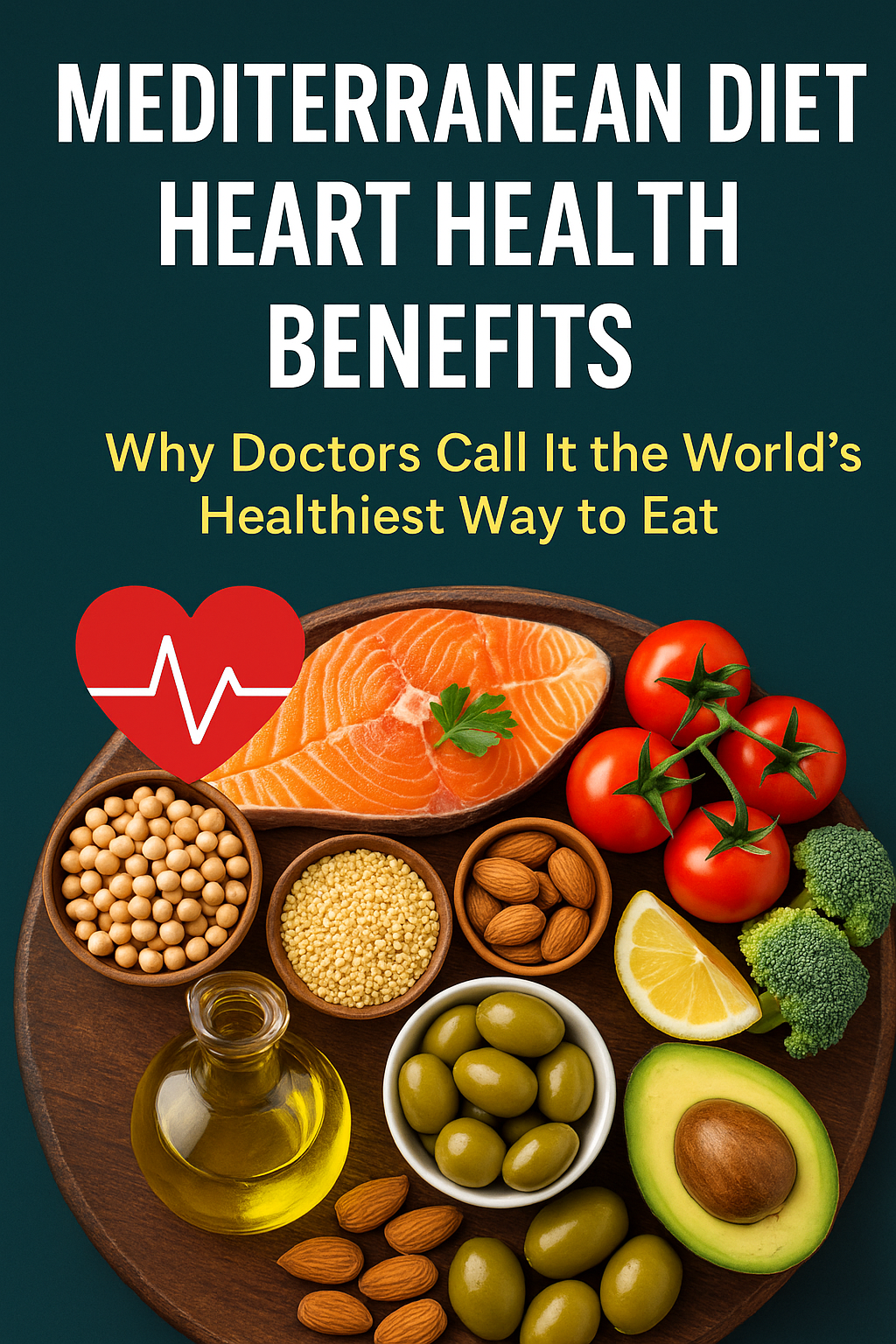If there’s one diet that has won over cardiologists, nutritionists, and health-minded readers across the U.S. and Europe, it’s the Mediterranean diet. What makes this centuries-old pattern of eating so special isn’t just tradition — it’s the mounting clinical and epidemiological evidence showing it protects the heart, lowers disease risk, and enhances longevity. In this article, we’ll break down the Mediterranean diet heart health benefits, unpack real studies (including randomized trials and long-term cohorts), show real-life scenarios, and help you see why doctors often refer to it as the world’s healthiest way to eat.
Background: What Is the Mediterranean Diet?
Before diving into benefits, let’s set the stage.
The Mediterranean diet is not a rigid “diet plan” in the calorie-counting sense. Rather, it is a way of eating traditionally observed in Mediterranean regions (e.g., Greece, southern Italy, Spain) that emphasizes:
- Whole, minimally processed plant foods: vegetables, fruits, legumes, whole grains, nuts, seeds
- Healthy fats: especially extra virgin olive oil as the principal fat source
- Moderate fish & seafood, moderate dairy (often fermented forms like yogurt or cheese), some poultry
- Minimal red meat, processed meats, refined sugars, and ultra-processed foods
- In many traditions, moderate wine (usually red) with meals
- Social, communal eating and physical activity as part of the lifestyle
In short: it’s rich in fiber, phytochemicals, monounsaturated and polyunsaturated fats, antioxidants, and lean protein — a combination many researchers would call “food synergy.”

The Clinical Evidence: Trials & Cohorts Behind “Heart Health Benefits”
To earn the label “doctors love it,” the diet must stand up in the crucible of rigorous science. Fortunately, it does.
The PREDIMED Trial (Primary Prevention)
One of the landmark trials is PREDIMED (Prevention with Mediterranean Diet), a multicenter Spanish trial that enrolled ~7,447 middle-aged adults at high cardiovascular risk but without established CVD. Participants were randomized to:
- Mediterranean diet + extra-virgin olive oil
- Mediterranean diet + nuts
- Control diet (advice to reduce dietary fat)
Over a median follow-up ~4.8 years, those in the Mediterranean arms had a ~30% relative risk reduction in major cardiovascular events (myocardial infarction, stroke, or cardiovascular death), compared to the control arm.
Even after correcting statistical issues and republishing, the core findings held: a Mediterranean dietary approach yields meaningful protection.
In absolute terms, PREDIMED’s results corresponded to ~3 fewer major events per 1,000 person-years.
CORDIOPREV (Secondary Prevention)
While PREDIMED showed benefit before cardiovascular events appear, doctors also care about secondary prevention (i.e., after someone already has coronary disease). The CORDIOPREV trial studied ~1,000 patients in Spain with coronary artery disease, randomized to either a Mediterranean diet or a low-fat diet, over seven years.
Results: the Mediterranean diet group had fewer major cardiovascular events than the low-fat group, even when participants were already taking optimal medications (lipid-lowering, antithrombotic, anti-hypertensives).
This is especially compelling: even on top of medicine, diet delivered extra risk reduction.
Meta-Analyses & Observational Cohorts
Because RCTs are expensive and limited, many researchers also rely on meta-analyses and observational studies:
- A PLOS One meta-analysis combining six trials (~10,950 participants) found that compared to control diets, the Mediterranean diet was associated with ~37% lower risk of major vascular events (RR ~0.63) and ~35% lower risk of coronary events. It also showed benefits for stroke (RR ~0.65) and heart failure (RR ~0.30), though the evidence was more variable for mortality endpoints.
- A 2024 update review in ScienceDirect examined the long-term impact of Mediterranean diet adherence on cardiovascular disease across multiple populations, reinforcing protective associations.
- A European cohort, EPIC-Norfolk (UK), followed ~23,902 participants. Higher Mediterranean diet scores were inversely associated with cardiovascular risk, even in non-Mediterranean populations.
- In a European context, observational meta-analyses also linked Mediterranean diets to reduced risk of heart failure in multiple countries. For instance, a systematic review of European cohort studies recently found that better adherence was associated with a lower incidence of heart failure.
- A JAMA Network Open study of ~25,000 U.S. women (Women’s Health Initiative) over ~25 years showed that greater adherence to a Mediterranean-style diet was linked to lower all-cause mortality and reduced cardiovascular deaths, with mediation through cardiometabolic risk factors (e.g., lipids, inflammation, insulin resistance).
Together, these trials and observational data form a robust evidence base: Mediterranean diet heart health benefits are far more than theory.
How the Mediterranean Diet Works: Mechanisms & Mediators
Medicine loves mechanisms — knowing how something works is as persuasive as knowing that it works. Let’s walk through key biologic routes.
Lipid Modulation (Cholesterol & Triglycerides)
- The diet tends to raise HDL cholesterol (“good” cholesterol).
- It often reduces small, dense LDL particles, which are more atherogenic.
- It lowers triglycerides, especially in those with high baseline levels.
- In the PREDIMED subgroup, Mediterranean diet interventions improved lipid profiles.
Inflammation & Oxidative Stress
Chronic low-grade inflammation is a known driver of atherosclerosis. The Mediterranean diet is rich in antioxidants, polyphenols, flavonoids, and anti-inflammatory micronutrients (e.g. from olive oil, nuts, vegetables).
In mediation analyses of large cohort studies, reductions in inflammatory markers (C-reactive protein, fibrinogen) explain part of the mortality benefit.
Endothelial Function & Blood Pressure
Endothelial dysfunction is an early step in atherosclerosis and hypertension. Diets high in nitrates (from leafy greens, beets), potassium, and unsaturated fats support vasodilation, improved nitric oxide signaling, and lower blood pressure.
In clinical trials, Mediterranean diet interventions typically reduce systolic/diastolic pressure by 2–5 mmHg, a meaningful shift epidemiologically.
Insulin Sensitivity, Glucose Metabolism & Metabolic Syndrome
Because metabolic syndrome is a major CVD risk, the diet’s impact here is central. By improving insulin sensitivity, reducing visceral fat, lowering postprandial glucose spikes, and favorably altering lipid metabolism, the Mediterranean diet reduces clustering of metabolic risk factors.
Plaque Stabilization & Anti-Thrombotic Effects
Nutrients like omega-3s, monounsaturated fats, magnesium, and polyphenols may help stabilize atherosclerotic plaques, reduce platelet aggregation, and prevent rupture. This is part of why even among people already on statins and antiplatelet therapy, diet still adds benefit (as seen in CORDIOPREV).
Real-Life Scenarios: Putting Theory into Practice
Let’s imagine a few case studies (anonymized) to make the benefits tangible.
Case A: Sarah, 52, Suburban New York
- History: borderline hypertension (135/85 mmHg), LDL ~140 mg/dL, BMI 28.
- Concerned about her father’s history of heart attacks, she wonders: can diet really make a difference?
After switching to a Mediterranean-style plan (replacing butter with olive oil, having fatty fish 3×/week, eating legumes, whole grains, nuts, cutting down processed carbs and red meat), she sees in 6 months:
- Systolic BP drop: 7 mmHg
- LDL drop: 15–20 mg/dL
- Waist circumference: −4 cm
- Fasting glucose & HbA1c improved slightly
- Energy levels improved, less mid-afternoon slump
Her primary care doctor congratulates her and says: “If you keep this pattern, you’ve significantly shifted your risk curve.”
While she was also prescribed a low-dose statin, her cardiologist later points out that dietary changes likely added incremental benefit beyond the medication.
Case B: Marco, 63, Barcelona — Already Diagnosed Coronary Disease
- Underwent PCI (stent) 1 year ago; on statins, ACE inhibitors, beta-blockers.
- In the CORDIOPREV trial-type scenario, he adopts a Mediterranean diet faithfully over 7 years.
Compared to peers who stayed on a low-fat “healthy diet,” Marco’s risk of recurrent major cardiovascular events is lower — an advantage seen in CORDIOPREV.
Moreover, his inflammatory markers (CRP), LDL particle profile, and endothelial health further improved, and he avoided a second stent.
These stories aren’t fantasies — they mirror what the controlled trials and observational cohorts show. The key is adherence, consistency, and pairing diet with physical activity and medical care.
Quantifying the Benefit: Numbers that Move
Using statistics helps anchor claims in reality. Here are some notable metrics and effect sizes:
- ~30% relative risk reduction in major cardiovascular events (PREDIMED) in high-risk individuals.
- In PLOS meta-analysis, Mediterranean diet associated with ~0.63 relative risk for major vascular events (i.e. 37% lower risk).
- In CORDIOPREV, among patients with existing coronary disease, the Mediterranean diet outperformed a low-fat diet in reducing recurrent events.
- In the Women’s Health Initiative cohort (~25,000 women), higher Mediterranean diet adherence corresponded to lower all-cause and cardiovascular mortality; mediation analysis showed that changes in lipids, inflammation, and insulin resistance explained significant proportions of this benefit.
- In European observational meta-analyses, higher adherence is associated with reduced incidence of heart failure.
Putting it simply: adopting a Mediterranean diet can shift your lifetime risk of a major heart event by a magnitude comparable to taking a statin (in some contexts) — but without the pill burden and side-effect tradeoffs (assuming renal/liver health are stable).
Why Doctors Recommend It — Beyond the Headlines
From cardiologists’ perspective, the Mediterranean diet is a rare “sweet spot” in lifestyle prescriptions. Here’s why:
- Multifactorial benefit: It doesn’t target just one risk factor — it modulates lipids, blood pressure, inflammation, insulin, and endothelial function altogether.
- Low harm, high adherence potential: Unlike extreme diets, it is flexible, tasty, and sustainable over the years. Adherence tends to be better than very restrictive diets.
- Evidence-backed: Randomized trials + cohorts + meta-analyses support it.
- Complementary to medications: It works in addition to statins, antihypertensives, and other therapies (as CORDIOPREV shows).
- Holistic benefits: It also helps with cognition, cancer risk, metabolic syndrome, and quality of life — so doctors see it as holistic preventive care.
- Scalable globally: While originally Mediterranean, the pattern can be adapted to U.S. and European food systems (olive oil, nuts, legumes, local fish/produce) — making it relevant to your audience.
How to Build a Heart-Protective Mediterranean Meal Plan (Your Blueprint)
To reap the Mediterranean diet heart health benefits, it helps to translate theory into practice. Here’s a sample 1-week plan + guidelines.
Core Principles to Follow
| Principle | Aim | Examples |
| Use extra virgin olive oil as your main fat (20–40% of energy) | Provide monounsaturated fat & polyphenols | Drizzle on salads, roast vegetables, and sauté |
| Eat ≥3 servings of vegetables + ≥2 servings of fruit daily | Fiber, antioxidants | Greens, tomatoes, peppers, berries, citrus |
| Incorporate legumes and pulses 2–4×/week | Protein, fiber | Chickpeas, lentils, beans |
| Eat fish/seafood ≥2×/week | Omega-3s, lean protein | Salmon, sardines, mackerel, trout |
| Choose whole grains over refined | Sustained energy, better glycemic control | Brown rice, quinoa, whole wheat, oats |
| Eat nuts & seeds daily (a handful) | Healthy fats, vitamins, polyphenols | Walnuts, almonds, flaxseed, chia |
| Moderate fermented dairy | Probiotics, calcium | Greek yogurt, kefir, aged cheese |
| Minimize processed meats, sugary drinks, and refined carbs | Lower risk load | Avoid soda, chips, and pastries |
| Optional: moderate wine (red), with meals, for those who already drink | Polyphenols (resveratrol) — do not begin drinking just for this | 1 glass of red wine, if no contraindications |
| Lifestyle: move daily, sleep ≥7h, manage stress | Complements diet in CV risk reduction | Walk, cycle, strength + rest |
Example 3-Day Meal Plan (Heart Focused)
Day 1
- Breakfast: Greek yogurt + berries + walnuts + drizzle of olive oil
- Lunch: Quinoa salad with chickpeas, cucumber, tomato, parsley, olive oil & lemon
- Snack: Apple + almond butter
- Dinner: Grilled salmon with roasted vegetables in olive oil + spinach salad
- Light dessert: Fresh fruit
Day 2
- Breakfast: Oatmeal with chopped nuts, flaxseed, berries
- Lunch: Lentil soup + side mixed greens with olive oil vinaigrette
- Snack: Carrot sticks + hummus
- Dinner: Sardines (or mackerel) grilled, steamed broccoli, barley pilaf
- Dessert: A few squares of dark chocolate
Day 3
- Breakfast: Whole grain toast + avocado + tomato + olive oil / seed mix
- Lunch: Whole wheat pasta with tomato, garlic, basil, olive oil + side green salad
- Snack: Handful of mixed nuts + piece of fruit
- Dinner: Chicken breast (skinless) with Mediterranean vegetables (eggplant, zucchini, peppers) sautéed in olive oil
- Dessert: Greek yogurt with a drizzle of honey
You can extend these patterns over a full week by varying proteins, vegetables, grains, and legumes. The key is consistency.
Addressing Objections & Pitfalls (What Could Go Wrong & How to Fix It)
As a blogger, your readers will have doubts. Addressing them head-on builds trust.
Objection 1: “Isn’t olive oil still fat — won’t I gain weight?”
Answer: When incorporated properly (replacing less healthy fats, not adding on top), olive oil may help with satiety and stability of blood lipids. Clinical trials did not show weight gain; in many cases, participants lost visceral fat or improved body composition.
Objection 2: “Can I still eat red meat / occasional treats?”
Answer: Yes — the Mediterranean diet is flexible. Red meat is usually limited to small portions a few times a month. The occasional treat is fine, especially if the base pattern is healthy.
Objection 3: “I’m in Northern Europe / U.S. — can I follow this if I don’t have fresh Mediterranean produce or olive oil?”
Answer: Absolutely. Many components (nuts, legumes, fish, olive oil, leafy greens, seasonal produce) are available widely. Use local versions: rapeseed oil, walnut oil, cold-pressed oils, local nuts, legumes, whole grains, etc. What matters is the pattern, not the precise geography.
Objection 4: “I already take statins/blood pressure meds — is diet still helpful?”
Answer: Yes, many trials (like CORDIOPREV) show that the Mediterranean diet provides an additive benefit beyond medications, improving residual risk in medically treated patients.
Objection 5: Adherence/sustainability
This is the real test. Many diets fail because people give up after a few weeks. That’s why the Mediterranean is well-loved: it’s palatable, flexible, socially oriented, and sustainable.
The Mediterranean diet heart health benefits are no mere fad — they’re backed by strong trials (like PREDIMED), real-world secondary prevention (like CORDIOPREV), and large cohort data spanning continents and decades.
Doctors often praise it because it’s one of the few dietary interventions that delivers broad, consistent benefit — reducing lipids, inflammation, blood pressure, and insulin resistance in tandem.
For readers in the U.S. or Europe, adopting its principles is eminently practical: use olive or high-quality monounsaturated oils, eat more vegetables, fish, legumes, whole grains, nuts — minimize processed foods, added sugars, and excessive red meat.
Start with a few meal swaps; build patterns slowly. Over time, your heart will thank you more than any pill ever could.

